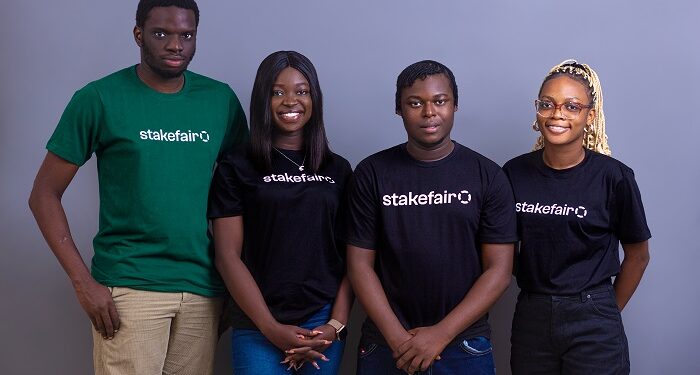In July 2022, Stakefair, a decentralised finance (DeFi) gaming platform, launched from beta. This follows a $670,000 pre-seed raised from Nestcoin, a global crypto company.
In an interview with CRESTHUB, founder and CEO of Stakefair, Akinyemi Akindele gave insights into the technology he is building.
What is Stakefair?
Stakefair is a DeFi gaming platform that allows players to bet on a no-loss concept.
The no-loss staking company was founded in October 2021 under the name BetDemand and tested its product in a 6,000-stake sandbox with $800,000 processed transactions.
By introducing DeFi into the prediction market, players can stake in high rewards without external interference.
Akindele told CRESTHUB that the idea was to create a safe option for players to bet on without the fear of losing their money.
“Deposit money against your bet and enter a lock-up period of about a week and at the end of the week, you get your money back whether you lose or win,” Akindele said.
“If you win, you get your interests. If you lose you get only the original amount,” he added.
How does Stakefair generate revenue?
Blockchain operates as a marketplace, and therefore, Stakefair takes advantage of it to “lend cryptocurrency to people who need it at different interest rates for different reasons. Some may need it to build leverage rates, but overtime will need to pay an interest rate to gain access to the cryptocurrency.”
Pooling the money after lending it on the blockchain generates returns after some time (usually a week), and the benefits earned are shared by the gaming company with the winners.
What makes Stakefair different?
There are a host of sports betting companies in Nigeria like Bet9ja, NairaBet and others.
Venturing into a market with existing players and holding a large percentage of the market shares would therefore, require a unique approach.
Akindele stated that the introduction of a no-loss concept, where it was impossible to lose a bet regardless of failed prediction, made the difference in the startup’s market approach.
“Once you place a bet, you cannot lose,” he said.
In order to generate interest for players, the platform needed a short-term savings protocol that could yield returns in a short while. And since no bank offered such service, Stakefair opted for a DeFi savings protocol that is easily programmable to allow for short-term savings interest.
Stakefair is a global company
Stakefair while in beta testing experienced an unprecedented growth as news spread by word-of-mouth through users who enjoyed the product.
“The product just sold itself,” Akindele said. Since Stakefair operates on DeFi, the narrative of the company became global.
“We are not a Nigerian company. By virtue of the fact that we are built on DeFi, we are a global company. We have customers from across the world.”
Sourcing for funds as a local founder:
In March, Africa: the Big Deal analysed the distribution of funding among locally trained African CEOs and those with foreign degrees based on their LinkedIn profiles.
Homegrown talent still has it harder to raise funds. CEOs who last studied in Africa signed 44% of the deals in 2021 while Africa-trained CEOs raised only 28% of the total amount raised on the continent, The Big Deal reported.
Akindele, however, believes things are getting better in Nigeria’s ecosystem.
“In the past, around 2016, people from abroad usually attracted funds but now funding for local Nigerians is looking up. There is a democratisation of funds for local founders. Things have changed over the last 5 years,” he said.
How did Akinyemi Akindele come this far?
Akindele studied Computer Science at the University of Ibadan. As part of his 6-month internship program, he spotted a place at Interswitch, a digital payments and e-commerce company. It was there that he had his first introduction into blockchain where he trained with the research and development team.
“I worked with a fintech company in 2016 as a software engineer. I was working in the research and development team where eventually we had access to work on exciting projects. One of the things we worked on was blockchain. That was my very first introduction to blockchain. I’ve worked for companies like Binance and nTech. Binance is like the world’s biggest crypto exchange,” he explained.
Akindele admitted that working in the blockchain space opened him to possibilities.
“When you are in space you get a lot of experience and everything comes from there,” he confirmed.
What’s next?
Stakerfair is now working on expanding its product offerings to become a business-2-customer company. The gametech is aiming at improving gaming experience for players, adding more games, and sorting the needful in its products.
Akindele said that Stakefair was working on its ‘lending and borrowing project that is built on the blockchain.’
“We are about to launch that in the coming months.”
The company is also working on its DeFi Application Programming Interface (API), to build a set of tools for APIs where other developers would be able to create DeFi in an easy and accessible way.
So, beyond being a business-2-customer company, Stakefair will become a business-2-business startup. The DeFi technology will enable other companies to build their own technology.

































